The College Tour Brings Equity Decision-making into the Classroom
By Samantha Jonas-Hain, Faculty Focus I August 15, 2022
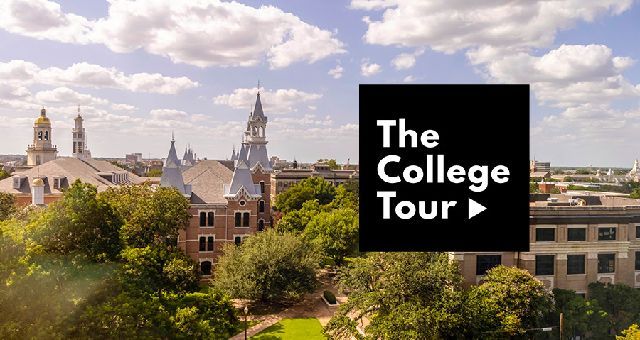
Every now and then the worlds of entertainment and education collide, producing something magical for both teachers and students; a moment where learning and personal growth is seamlessly achieved by an eager audience. Classic shows like Reading Rainbow, Bill Nye the Science Guy, and The Magic School Bus are spectacular examples of just how useful the right television show can be in an academic setting.
Cue the eponymous lyrics, “Conjunction junction, what’s your function?” Much like its aforementioned predecessors, The College Tour is the latest educational program to break into the classroom and is doing the near impossible—engaging teenagers!
Gaining a large following of high school students, teachers, and counselors, The College Tour has become the unsung hero of college readiness preparation, enabling an equitable distribution of information among the entire student body for free. The College Tour—which streams on Amazon Prime and is also available for free through its website, app, and Freevee—travels to colleges, universities, and community colleges across the country sharing first-person stories of what life is like on campus. Each episode features a diverse group of students with varying backgrounds, interests, and academic levels. The show focuses on inclusiveness, and features episodes with hearing-impaired students, autistic students, first-generation students, and multilingual students.
Because touring colleges can be logistically difficult, teachers have brought the show into their classrooms as a way to supply students with meaningful information so students can make decisions beyond the scope of what they may have deemed possible—or rather impossible. Counselors in low income schools are relying on The College Tour to foster a connection to higher education and help students identify with their onscreen contemporaries. The show is told from a student’s perspective, where viewers can better connect with students on the show and their academic journey, regardless of race, gender, socioeconomic status, or learning needs.
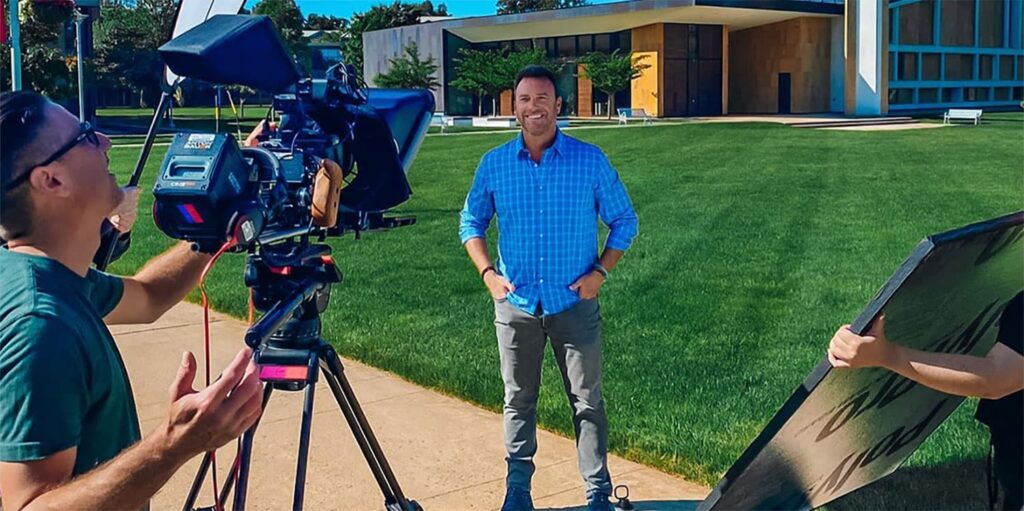
“The goal of our show was to make college truly accessible to everyone,” said show co-creator, host, and executive producer Alex Boylan. “Whether it is COVID-19 restrictions, financial limitations, or even medical limitations, we set out to make a show that defines equity. The response from the educational community has been phenomenal. Teachers and college counselors have thanked us for helping put kids on a college track that they otherwise weren’t sure would be achievable.”
Boylan, a former winner of The Amazing Race, said the response from the academic world was so robust they expanded The College Tour website so that it will include “The Class,” a free curriculum teachers can use in the classroom to help students identify what matters most when deciding on a college. “The Class” is broken down into four key pillars: location, campus culture, majors, and types of school. It also features corresponding videos and assignments for student to help them learn how to make educated decisions that are based on their own personal needs and desires.
“We created ‘The Class’ as an additional tool to help students hone-in on what is important to them. Teachers have been showing The College Tour episodes in class regularly, and this will now enable them to have a supportive curriculum to help students think critically about their priorities,” Boylan added.
College counselors have also found the show useful in helping students identify schools outside of their scope, particularly in lower income areas and the Latino community. The College Tour recently aired their first ever, all-Spanish episode at Maricopa Community College Systems, one of the largest community college networks in the country. This episode speaks particularly well to first-generation students, immigrants, and English to Speakers of Other Languages (ESOL) students.
“I am a first-generation immigrant for whom the process of getting into college has been one of the most intimidating things I have ever faced,” said freshman Frida Guzman, who was featured in our recent episode. “However, since I have been at Chandler-Gilbert Community College, I knew I had the chance to become an honors student at the college level…I’m currently in the process of earning a business administration degree, as well as participating in the Presidential Honors program, DECA club, and Phi Theta Kappa Honors Association.”
Since it began two years ago, The College Tour has represented an honest, student perspective of higher education. The goal is to introduce the show into the classroom at a young age and help build a sense of belonging on campus. In fact, many middle schools are using the show to teach US geography as a fun and informative way to see college from a young person’s lens. By doing so, students are gaining familiarity with college life at an early age while also seeing what life can look like living in different parts of the country. Students can also use “The Class” as a way to begin conceptualizing their academic future. The earlier they decide to become college bound, the more successful they will be in accomplishing that goal.
Through free episodes and “The Class,” teachers have endless ways to inspire the next generation to take the steps necessary to pursue an educated future. Each episode serves as a snapshot of what could be, while the accompanying curriculum helps students identify ways to make this a reality.
The College Tour is currently in its fourth season and is streaming on Amazon Prime. All 49 episodes are available on Home – TheCollegeTour.com.
15 Fun College Towns in the South
By Cloy Clauborn, US News and World Report I June 22, 2023

What makes a good college town?
A university’s stated purpose may be to educate young adults and prepare them for their future careers, but its role in the community tends to far exceed that. Colleges, particularly major universities with big-time athletic programs, can instill a sense of pride and cohesiveness to the surrounding area.
In so-called “college towns,” the student population typically has a major impact on the city’s population as well as its culture and social scene. In bigger cities with more than one university, the school pride may not be as focused, but the influx of a younger population can still make for a fun scene and create an enjoyable environment for young people.
“I think when the town is driven by the college, that really makes something special,” says Alex Boylan, executive producer and host of The College Tour, an internet-based television show that provides free virtual tours of college campuses. “When it’s a real college town, what happens is everyone is in it. Everyone is part of this journey.”
Whether the draw is sports, culture, food or everything in between, here are 15 fun college towns in the South. These are just a sampling; of course there are many more fun college towns that are worth a visit.
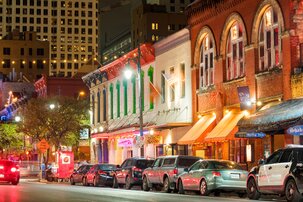
Austin, Texas
A popular destination for young adults, ranking No. 18 in U.S. News’ list of Best Places for Young Professionals to Live, Austin is home to the University of Texas at Austin and full of hip restaurants, live music and outdoor events. With the Colorado River running through the middle of the city, swimming holes all around and lakes both downtown and within driving distance, there are plenty of opportunities for students to be on the water.
The city is full of hiking and biking spots as well, Boylan says. One thing that’s unmistakable is the city’s passion for the Longhorns. “When you’re in Austin, everyone’s wearing burnt orange,” Boylan says. “Everyone bleeds Texas. I think there’s just something really special there.”

Jacksonville, Florida
Just up the road a little over an hour from Gainesville is Jacksonville, home of Jacksonville University and the University of North Florida. JU is located on the St. Johns River and gives students a view of downtown, which is just two miles away and full of restaurants, shops and other popular spots. Atlantic Beach and Jacksonville Beach are a short drive away and are even closer for UNF students. These beaches are “some of the quaintest, most fun beaches in town,” says Boylan, a Jacksonville alum. JU students not wanting to drive that far can visit Kurzius Beach, a small on-campus beach on the St. Johns River, while UNF students can enjoy Candy Cane Lake, which runs through the middle of campus.
With nearly 1 million residents, Jacksonville is larger than other quintessential college towns, but Boylan says students benefit from having a National Football League team, the Jacksonville Jaguars, nearby as well as other big-city amenities like plenty of choices for bars and nightlife spots. It also ranked in the Top 20 in U.S. News’ Best Places for Young Professionals and No. 16 in Best Places to Live.
Urban, Suburban and Rural Colleges: How to Choose
By Cole Claybourn, US News & World Report I March 28, 2023
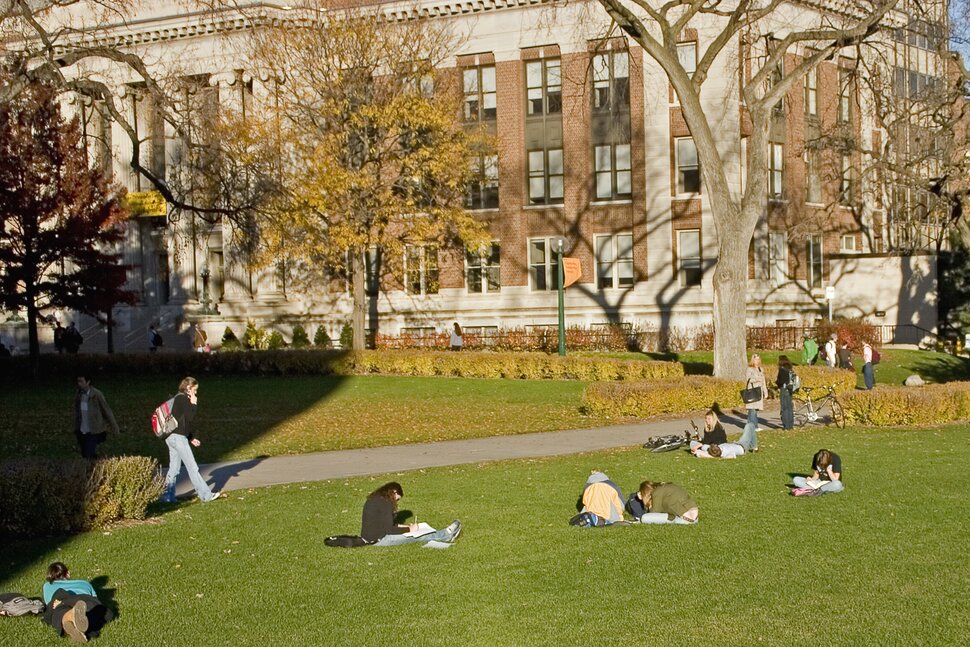
Location is one of the many important factors prospective students weigh when choosing where to go to college.
This decision isn’t just about how far they’ll be from home – it’s also about the kind of place they’re in, whether that’s a big city, a small college town or the quiet countryside.
Each setting – urban, suburban and rural – can offer profound learning and cultural experiences. But that doesn’t mean each location would be a natural fit for every student. Some may find themselves overwhelmed by the hustle and bustle of big city life, while others long for more activities than they might experience on a secluded rural campus.
“When people are looking at places, I think the geographical area of the country is important. That’s usually the first determining factor,” says Matt Woodworth, founder of college admissions consulting company Woodworth Prep. “One of the things I find interesting is that it’s also one of the few areas where kids and parents will not quite have the same view.”
Why College Setting Matters
There are a variety of factors to consider when it comes to a college setting, experts say. A school situated in a downtown area can provide a vastly different experience than one at a more isolated campus in a small town or suburban area.
[
READ: What to Consider When Visiting a College Town. ]
“It’s important you feel comfortable at a college of your choice and the setting of a college could impact what your comfort level is,” Eric Nichols, vice president for enrollment management at Loyola University Maryland, wrote in an email. “Do you want to live in a big city, just be adjacent to (a) city while having a residential campus experience? Or are you comfortable with a small college town that is tucked away from a metropolitan area?”
He adds that students often spend more time on campus than they initially expect.
Students typically have an idea of what their ideal lifestyle is and it can be helpful to choose a college that will cater to that, Woodworth says.
“It tends to go two directions,” he says. “What I find a lot of times is that kids want to repeat the environment that they grew up in. If they grow up in a small town, they want to go to a place in a small town. If they grow up rural, they want to go somewhere rural.”
By “keeping with what’s familiar,” students are able to enter college more comfortably, Woodworth says.
U.S. News asks colleges to self-report their settings in its annual survey. The below map shows the top-ranked schools by setting – rural, suburban or city/urban.
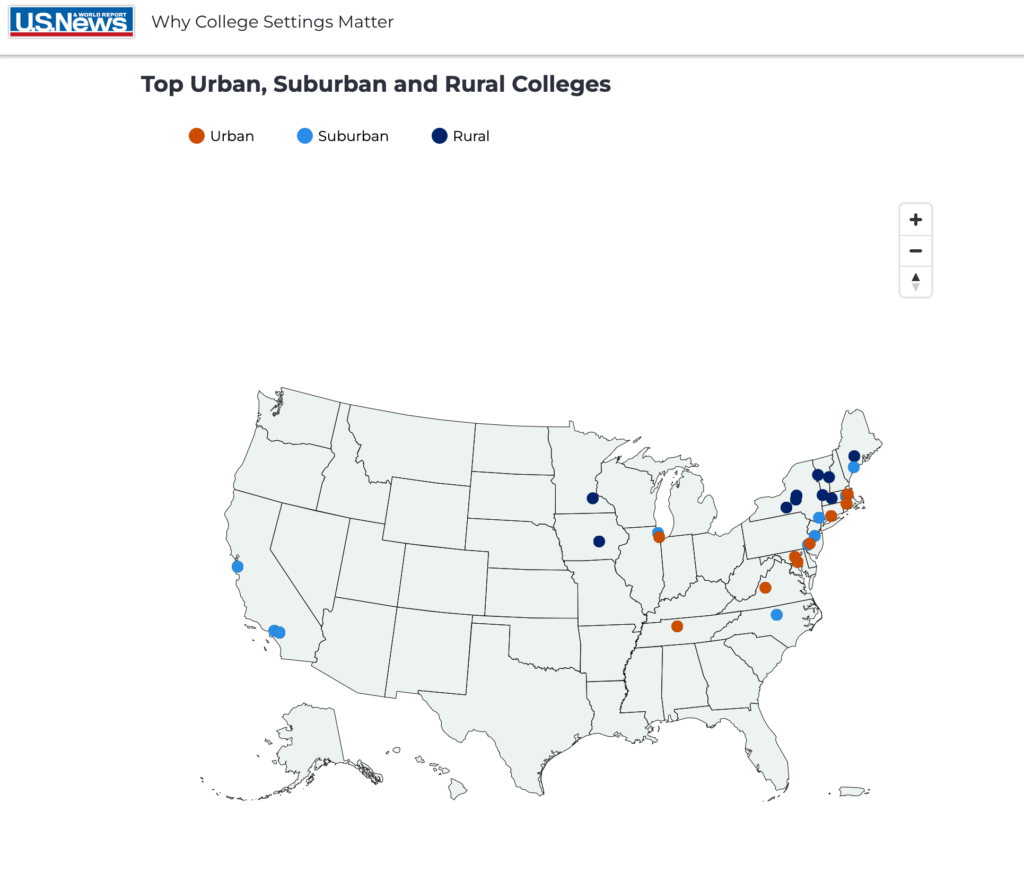
Finding the Right College Setting
Students should also consider setting when thinking about opportunities beyond the classroom, says Mandee Heller Adler, founder and president of International College Counselors. Many students tend to find jobs and internships in or near the city where they attend college, and some end up staying and working in that area after building personal and professional connections.
“Another factor to think about is opportunities for work experience and internships during the school year,” Heller Adler wrote in an email. “The choices are slimmer in a small city as compared to New York City, Washington D.C., or Los Angeles, for example.”[
READ: How to Make a College List. ]
Some fields are particularly location-specific. “If you’re thinking about going into something like tech, it’s going to be much more advantageous for you to be near Silicon Valley,” Woodworth says, “but the other problem is that it is going to cost a lot more to live in a city for four years while you’re in college. So you have to weigh that in, and that’s part of the college experience.”
On the other hand, students interested in fields like environmental science may see those opportunities in abundance in a more rural setting.
Heller Adler suggests also considering the activities you’d like to pursue outside of class. For instance, students interested in opportunities for outdoor recreation may lean toward rural settings, while urban colleges are likely to offer access to a greater range of cultural activities.
Adler encourages students to consider what on-campus activities are offered, noting that “urban campuses typically have less of an on-campus community.”
Visit Before Jumping to Conclusions
Just because a college is located in a certain city or area doesn’t mean the campus itself is a direct reflection of that geographic space. Colleges are like cities unto themselves, and what’s happening in the broader area may not necessarily be the experience on campus. Nichols encourages prospective students to go visit a college rather than letting a description of the setting determine their view.
“For example, a school may be located in a city but the actual location of the campus itself may be on the edge of town and the setting may feel more like a residential suburban neighborhood,” Nichols says. “Not all big city schools have campuses that spill into the downtown area. It’s another reminder to always take the time to visit the schools you are most interested (in) rather than make assumptions based on location.”
If students can’t visit in person, then taking a virtual college tour is the next best option, experts say.[
READ: 21 Places Worth Seeing on College Tours. ]
Though a college setting can give students a loose idea of what to expect, there are often unexpected twists. Take Loyola University Maryland. While located in Baltimore, the college has an arboretum on 80 acres that was recently recognized as having the largest trees in the state, which may not fit student preconceptions of an urban area.
“If you can’t get to the campuses yourself and get a real vibe for it, how do you figure that out?” asks Alex Boylan, executive producer and host of The College Tour, an internet-based television show that provides free classes and virtual tours of college campuses to help students in their college decision process. Its videos share first-hand accounts from students to give prospective students what they hope is an authentic feel of the campus. “I think it’s huge because the cultural fit really ties into that location of what you’re looking for.”
Regardless of where students go, experts say they should expect an adjustment because college is still a new environment in and of itself.
“Moving somewhere new and truly feeling comfortable in a new environment takes time,” Heller Adler says. “Whether a student makes a big jump from urban to rural, or if they’re staying in their home city, feeling out-of-sync for some time during the first year of college is completely normal.”
She encourages students to get involved with activities and student organizations, build their own community, try new things and develop a peer group to support them through college.
“If a student is having a rough time, they should not be afraid to reach out to someone they trust, such as an advisor, professor or peer,” she says. “In college, no one should feel alone. And if a student is truly unhappy and feeling out-of-place, there is always the option to transfer.”
Searching for a college? Get our complete rankings of Best Colleges.
The Key to Success in the Television Industry With Lisa Hennessy
ACTION & AMBITION Podcast, Entrepreneur Magazine I September 28, 2022

Welcome to another episode of The Action and Ambition Podcast! Joining us today is Lisa Hennessy, an Emmy-nominated TV Producer, content creator, entrepreneur, and global citizen. Her career began in Television in 1995. For 14 years, she served as one of the driving forces behind Mark Burnett Productions. As an original member of the company, Hennessy played an integral role in developing and producing MBP television programs. She is now the Executive Producer of The College Tour, a TV series that tells the story of colleges and universities across the country. Today, she explains how you can prosper in the television industry. Tune in to learn more!

How to Help Students Find the Right College
By Samantha Jonas-Hain, Link for Counselors I October 10, 2023

As counselors you know firsthand just how unique each student is. From high achievers and athletes to those who are just getting by or hyper focused on one particular interest like art, no two student profiles are exactly the same, which is why a holistic approach to the college search, accounting for personal likes, dislikes, strengths, weaknesses, finances, and goals can make the difference between a subpar college experience and one that will truly set the student up for success. And while in the past the cost prohibitiveness of touring colleges left many students at a disadvantage, that no longer has to be the case, and the world can be on their radar!
Unfortunately, many students have a limited scope and understanding as to what college is, not realizing that when it comes to higher education it is not a one-size-fits-all game. Just because a school worked for their parent, sibling or friend doesn’t mean it is the best choice for them, but oftentimes trying to tell a teenager that they are wrong in their assumptions is a futile task. So what then? What is the best way to break students out of their myopic shell so they can find a school that will work best for them based on comprehensive consideration, and not just something as generic as liking a basketball team or the school’s colors?
Teens are inherently driven by expressing their individuality, and the college search is a great opportunity to play on that. Just as there are different genres of music, clothing styles, and food palettes that dictate what they wear, eat, and listen to, each college has its own flavor, style and harmony, and asking the right questions beforehand can give students the opportunity to really customize their future experience, which can be tailored to their needs and wants. Just as a vegan student wouldn’t eat a cheeseburger in the cafeteria, why would a student who has a fear of crowds go to a large school with 600-person lecture halls? The concept seems obvious, but only to those who recognize that there are many options to choose from when it comes to higher education. Not every student understands that there are small schools, large schools, private schools, state schools, HBCUs, Hispanic Serving Institutions, international learning opportunities, community colleges, online schools and even a semester at sea!
In less than three years our tv show The College Tour has visited over 110 colleges and universities across the country, and has spoken to thousands of students about their individual pathways and experiences on and off campus. Whether it was at a big school like University of California, Riverside or a small school like Hanover College, our takeaway was that finding the right school is the biggest factor when it comes to ensuring a successful outcome for the student. While those specific factors look different for each student, there are universal ones that we recommend each person to consider in their college search, such as accounting for location, majors, size, type of school, and campus culture. In fact, we created a series of interactive online classes that in under an hour can help students figure out what priorities they should keep in the forefront of their college search based off of those key pillars. Classes include Majors, First-Generation Students, International Students, and Core classes, each using video-based segments directly from our show, all told through the lens of current students. Having that peer-to-peer communication is extremely advantageous for teens as it enables them to identify with being on campus. In each episode of our show, The College Tour, we feature 10 different student-led segments, all of whom are from diverse backgrounds,with varying abilities, interests and learning styles. Our goal is to allow the viewer to see themselves thriving in higher education, regardless of where they come from. The show and website are free of charge, and have been created literally to help both the counselor and student!
The daunting nature of the college search is nothing new, and while a plethora of content is readily available to this generation oftentimes the problem is that they don’t know where to start and what to be looking for. Navigating what seems like an endless sea of information can trigger some students to take a step back. To combat the overwhelming nature of this new stage in their life, we believe in giving them an easy to digest approach based on pragmatism and critical thinking. This decision doesn’t happen overnight, and trying to figure it all out once can be a recipe for failure. By breaking it down into fragmented categories to use as a springboard to narrow down what will work best for them individually, students will take the time to really think about what is important to them. Here are some ideas of how to get this process moving.
Check the Surroundings
Locations are as varied as the students themselves. There are schools close to outdoor recreation like hiking and rock climbing, and then there are those schools that are smack in the middle of a bustling big city, or sitting in a rural area near farmland. The question to the student is, “Where do you most want to be?” Maybe they want to be in a suburb close to a metropolis so they have access to high-level internships, or maybe they want to be in a small town. Whatever the answer is, have them use that as a guide to finding a school. Each one of their answers narrows down the list of schools that are right for them and can very quickly shift their focus to something that is a much better fit.
Also, aside from the main campus being considered, many schools offer study abroad opportunities around the world. If your student is someone who loves adventure, travel, and getting to learn about different cultures and languages, consider steering them toward a school that can expand their horizons and provide unique learning opportunities, like being a part of Semester at Sea!
Feeling Included
When it comes to college, there is a community waiting for everyone. If finding a school with a strong LGBTQIA is important to your student, find one that is known for their supportive pride community, like Sarah Lawrence College. Or, make sure the school that they are interested in has at least a club on campus or a support system that is equipped to provide your student every resource they need to thrive on campus.
For students with various learning styles, health conditions or other impairments it is critical to make sure their needs can be met even before applying to the school. Identify what needs your student has and use that as the guide to finding the school that can not only accommodate that need but support it as best as possible. Schools like Landmark College that are designed for students with ADHD, autism spectrum disorder, executive function disorders and learning disabilities, and can be an amazing alternative for students who need extra help.
The Spirit Guide
There are schools that are notorious sports schools, where the entire campus partakes in game day fun. For some students this type of atmosphere is exhilarating, and a dream come true, but to others it is a reason to feel isolated and out of touch with their fellow student body.
College is a time to learn, grow and make friends, but if your student feels like the odd man out, that situation can be stressful and hinder their success. Remind students that “school spirit” can come in many forms. There are places like The University of Utah, where community engagement events are designed to bring students together, and then there are schools where they have a close-knit relationship with the community right outside the campus. Sororities, fraternities, clubs, and student leadership opportunities can all help bolster a sense of pride, as well. Supporting a school’s sports’ teams is great, but it isn’t the only way to have a communal experience. It’s important for students to have access to groups that cater to their interests, whatever they may be.
The Culture Club
College is the place to celebrate who you are, and there are campuses around the country that are geared toward allowing students to connect with a particular culture or community. For example, historically black colleges, known as HBCUs, including schools like Xavier University and Jackson State University afford black students the ability to be on a campus surrounded by people of similar backgrounds. Hispanic Serving Institutions, known as HSIs, which include schools like Florida International University and Kean University, are driven toward helping the latino community, many of whom are first-generation college goers.
Devout students will be happy to know that keeping the faith can continue on campus, as well. There are plenty of religious colleges and universities like Abilene Christian University, St. Mary’s University and Yeshiva University that are designed to not just support a student’s faith but nurture it, and provide them with likeminded people who share the same values.
As for ROTC and military students, finding a military-friendly college, such as The University of Alaska Fairbanks, is important, as the school will be helpful with navigating the nuanced challenges that come with being in the military.
Culture is part of a student’s identity and finding a school that reflects that culture can heighten their experience in more ways than one.
Costly Considerations
For many students college comes down to cost, and oftentimes that even starts with the tour itself. It used to be that in order for a student to truly check out the schools that they were interested in they would need to physically go there to get a sense of place, but contemporary students have the advantage of new age digital experiences that can broaden their scope from anywhere. The College Tour was created just for that purpose, and is a great example of technology that brings the schools directly to the students free of charge.
Additionally, numerous resources are available to assist students in navigating financial aid, discovering scholarships and grants, which can ultimately transform attending a school from an impossibility into a tangible possibility. Don’t just rule out a school based on price alone . Some schools even base their tuition on a sliding scale dependent on family income.
Sizing up the Situation
With 900 community colleges and 2,500 four-year institutions across the country, there is no reason why any student has to go to a school that they find too large or too small. When looking at schools, it makes sense to take the Goldilocks approach. Have your student look at the student population, and ask themselves, “Does this feel too large, too small or just right?” Aside from looking at the total number of students, have them find out about dorm size, class size and even the amount of extracurricular activities and clubs. Aside from having larger facilities, larger schools with larger populations may offer more clubs and resources, however, some students may work better in an intimate setting and benefit from being able to build relationships with their professors.

Major Motivators
College is a time to keep an open mind, but it is also important for incoming students to know exactly what type of majors are available to them. There are students who may dream of being a pilot, so finding a school with a great aviation program is one step closer to making their dream become a reality. Another reason to investigate a school’s majors is that there are many exciting majors that students don’t know exist, such as video game programming and development, and agriculture. New innovations and industries are constantly burgeoning, and the future jobs of tomorrow are finding their way to today’s campuses. Learning about a school’s majors can inspire students to embark on a new path of discovery.
Take the Temperature
Some students love the cold and others hate it. Some schools allow freshmen to have cars on campuses and others don’t. It’s important for students to figure out just what type of environment they want to live in. If they don’t mind the heat or walking in the snow, take note of that, but if they do, take note of that as well. There are campuses that can give you a taste of all four seasons, and then there are those that offer year-round sun, which is a great option for those who like water sports and find that they are happiest when soaking in Vitamin D. It may seem simplistic, but environment and weather shouldn’t be discounted. Students are only in class for a set amount of time, and being in a place where they feel comfortable will benefit their overall welfare.
***
College isn’t just about freedom from parents and freedom from the k-12 school system. It is about freedom to become who you want to be. It is a time of new beginnings, a path to the rest of your life. Counselors have the incredibly difficult job of guiding students not just toward that future, but making sure it is lit brightly. One of the most rewarding aspects of working on The College Tour is knowing that we are not just helping the students find the right college but that we are helping counselors in their constant quest to lift up the next generation. Each campus we visit is a new opportunity to understand the vast, and ever changing landscape of higher education. Our knowledge is your knowledge.
What an effective college search really comes down to is clarity. By definition, clarity can be regarded as “freedom from indistinctness or ambiguity.” Clarity is the ultimate in mindfulness, and gives students intelligibility, and a sense of control when it comes to their destiny. Even if a student takes the time to consider just one of the aforementioned topics, they will have that much more of an understanding of themselves and an elevated perception of their role in higher education. In fact, in some cases, these simple questions can make the difference between a student continuing on to college or not. Different things motivate different people, and rooting out a student’s motivation can be the catalyst for a positive attitude while determining their journey.
We all have our college memories, some more exciting than others, but the one thing we can all agree on is that college is a turning point in a young person’s life, regardless of whether they stay home and go to a community college or venture half-way around the world to study abroad. The skills that you are helping them build in this search will be everlasting, and maybe one day they too will look back on their college experience and remember the amazing counselor who helped them realize that it was all possible.
The College Tour is a groundbreaking TV series that takes the viewer on an intimate journey through campuses across the country, telling each school’s story through the diverse lens of its students. Hosted by The Amazing Race winner Alex Boylan, The College Tour brings equity to college readiness by providing a platform to access comprehensive and meaningful information regarding higher education anytime and anywhere, free of charge. The College Tour is available on Amazon Prime Video and on www.thecollegetour.com.
The College Tour Host Alex Boylan Tells Fox Business That Students are “Excited that College is Back”
Fox Business I August 26, 2022
Alex Boylan sat down with Fox Business’ Varney & Co. to discuss Season 5 of The College Tour, and the excitement that students feel to be back on campus. “This generation has dealt with a lot over the last two years between lockdowns and social distancing and campuses are alive again,” Boylan told guest host Ashley Webster. “There’s nothing better than being on a college campus,” he later continued. “This next generation is incredible.”
“The College Tour” Helps Students Find Their College
National Report I October 20, 2022
Olympic College to be featured in ‘The College Tour’ video series by Amazon Prime Video
By Jeff Graham, Kitsap Sun I December 1, 2023
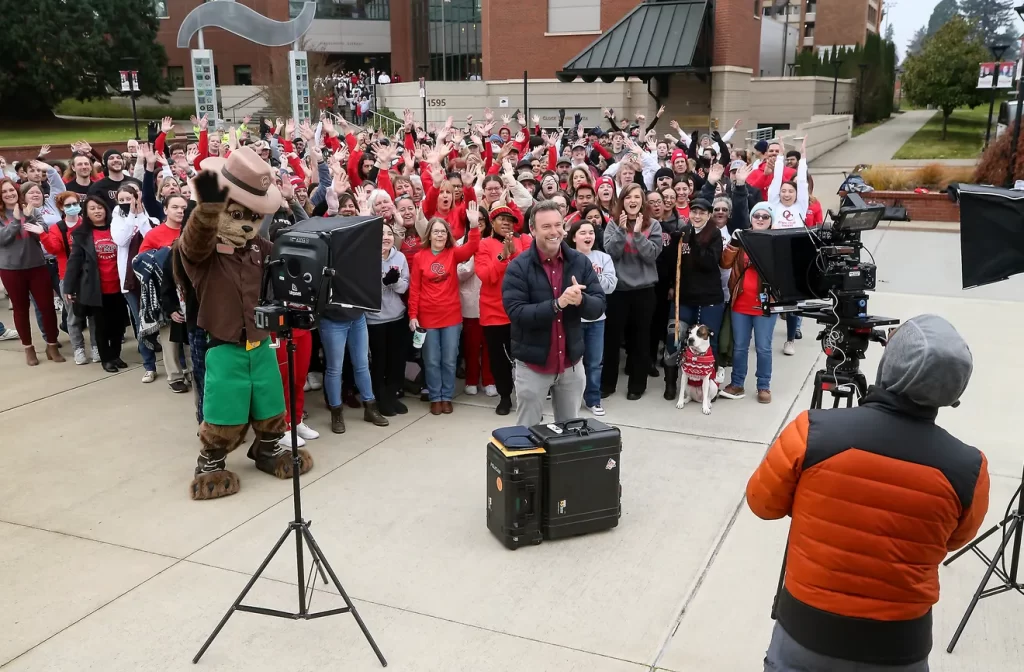
Telling the story of colleges and universities across America through the authentic lens of real students.
That’s the motivation behind “The College Tour,” according to show host, creator and executive producer Alex Boylan, who spent time this week on campus at Olympic College. OC will be featured on the 11th season of “The College Tour” on Amazon Prime Video this spring.
“The energy, excitement for the students here is strong,” Boylan said.
Featuring 30-minute episodes, “The College Tour” has featured over 100 schools both big and small, including two in-state schools: the University of Puget Sound and Central Washington University. OC, which annually serves over 8,500 students at its main campus in Bremerton and satellite campuses in Poulsbo and Shelton, will be the first community college in Washington to be featured.
The idea for the show, which premiered in 2020, began when Boylan helped his niece search for colleges as a high schooler. “The College Tour” focuses on attracting prospective students who may not be able to visit and tour campuses around the country. Episodes typically feature 10 current/former students of various backgrounds as they discuss campus-life and community, as well as their courses of study and experiences.
OC will be featuring Mora Morales (film-making program), Anne Edwards (practical nursing), Drew Warrington (engineering program), Guyland Charles (student-athlete), Jeffrey Timm (a military veteran enrolled at Western Washington University/OC in Poulsbo), Keya Rohlman (OC alumni grant funding), Ryha Sisson (Running Start at OC in Shelton), Tina Habibullah (a military dependent nursing student), Tovi Agtay (OC Bachelor’s degree graduate, career center staff) and Vecksle Drake (alumni, transfer to University of Washington).
“It’s just neat to hear from actual students sharing their story,” said Shawn Devine, OC’s executive director of communications, web and marketing.
Boylan, a former collegiate soccer player at Jacksonville University and winner on Season 2 of “The Amazing Race” back in 2002, spoke during a lecture and Q&A session on Wednesday at OC’s William D. Harvey Theatre. He encouraged students in attendance to discover what they are passionate about and not be afraid of changing course.
“Finding out what you don’t like and what you are not good at,” he said, “is just as important as finding out about what you love.”
Boylan only discovered his love for media storytelling after he graduated. His first job out of college was as a financial market analyst. He hated it.
Now that he’s found his true calling, Boylan looks forward to taking “The College Tour” to more institutions like OC. He estimates 15-20% of the schools he’s visited have been community colleges. For many students across the country, he said that’s the perfect first step after high school.
“This is a great place to explore and try new things,” he said.ChipotleSponsoredRecommendedBangor-based USS Henry M Jackson submariner died by suicideNEWSEffy Diamond Emerald-Shaped Cluster Bridal Set (3/8 ct. t.w.) in 14k White Gold – White Gold$1,315.65 – Macy’s|AdKaren Scott Petite Fleece Crewneck Sweatshirt, Created for Macy’s – Smoke Grey Heather$14.99 – Macy’s|AdKaren Scott Petite Fleece Pants, Created for Macy’s – Deep Black$14.99 – Macy’s|AdKarl Lagerfeld Paris Women’s Imitation Pearl Detail Knit Shrug – Soft White$48.30 – Macy’s|AdJm Collection Women’s Printed Poncho Turtleneck Sweater, Regular & Petite, Created for Macy’s – New Fawn Combo$30.79 – Macy’s|AdLacoste Men’s Waffle-Knit Thermal Sleep Shirt – Red$32.73 – Macy’s|AdPawn Star Pleads Guilty, Goodbye Pawn Stars 🙁HotPopToday|AdRead MoreAmazon Hates When You Do This, But They Can’t Stop You (It’s Genius)Online Shopping Tools|AdPayPal for businessPayPal|AdLearn moreCharlotte – BlackORTHOFEET|AdBuy nowDeal of the DayAugustinus Bader Has A Super Rare Skincare Deal HappeningREVIEWEDView DealRecommendations are independently chosen by our editors. Purchases you make through our links may earn us a commission.RecommendedMan linked to business, vehicle vandalism incidents in West BremertonNEWSOutlet Allyson Quilted BalletCoach Outlet|AdBuy nowVoyager Medium Two-Tone Metallic Logo Tote BagMichael Kors|AdShop nowMore Local StoriesCrash kills two near Hood Canal bridge where roundabout is plannedNEWSBangor-based USS Henry M Jackson submariner died by suicideNEWSCatalyst Public Schools, Kitsap’s only charter school, to expandNEWSBremerton neighbors react to Oyster Bay homeless shelterNEWSFuzzy Floral Jacquard Ann Cardigan Black Women’sAnn Taylor|AdShop nowBedford Medium Pebbled Leather ToteMichael Kors|AdShop nowAmazon Hates When You Do This, But They Can’t Stop You (Try It Now)Online Shopping Tools|AdOh my Bob!Bob’s Discount Furniture|AdShop nowMore Local StoriesKing tides coming to Puget Sound in DecemberNEWSA great Kitsap Sun newspaper carrier is rememberedOPINIONOishi restaurant brings Japanese grilled meats to KitsapNEWSBainbridge, North Kitsap net all-league volleyball MVP awardsSPORTS
Florida Tech Lights Up Small Screen With New Episode of ‘College Tour’ TV Series
By Adam Lowenstein, Florida Tech News Bureau I November 28, 2023
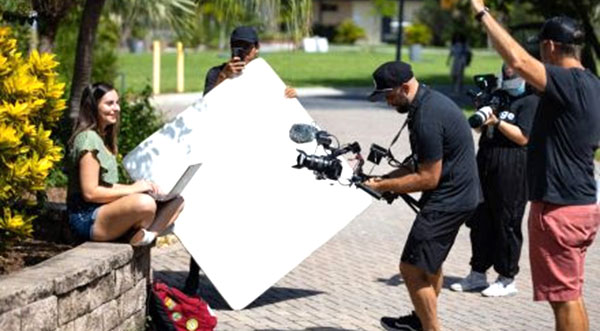
BREVARD COUNTY • MELBOURNE, FLORIDA – Blowing up the Hollywood adage that sequels rarely match the original, the students, scholarship, and sunshine at Florida Tech are returning for a fun and exciting new episode of “The College Tour,” the award-winning TV series on Amazon Prime Video.
While the episode doesn’t drop on Amazon until Feb. 27, the Florida Tech community is invited to see it sooner with an exclusive, early-access watch party. At noon on Thursday, Nov. 30, join the watch party virtually on the FloridaTechOfficial YouTube channel.
Details regarding an in-person campus event to celebrate the release on Amazon will be announced in the coming months.
The university’s first episode was released in December 2020 and is available to view on Amazon or YouTube.
In the university’s latest episode, 10 amazing students highlight what’s new on campus, such as the esports center and health sciences building, while reminding viewers of what has not changed: the university’s beautiful location, welcoming community, inspiring faculty, innovative culture, and amazing, hands-on academic programs.
The students featured are: graduate student Lauren-Ann Graham ’20; Darin Hiraldo; graduate student Nashaita Patrawalla ’19 ’21 M.S.; Marcello Mattei ‘22; Zach Miller; Ceana Palacio; Josianne Keenan; Carter Batt; Jared McColpin; and Emma Conti (pictured above).
Throughout the episode, each student shares their unique Florida Tech experience, providing viewers with an authentic look into life at Florida Tech.
Kathryn Hatfield, senior marketing strategist, and project manager who led the production from the Florida Tech side, noted that each student got to write their own script and bring the episode to life through a collaborative process with both the university marketing team and “The College Tour” producers.
“Telling Florida Tech’s story from the perspective of our students—and sharing it on a platform as large as Amazon Prime Video—is what makes ‘The College Tour’ so impactful,” Hatfield said.
“Their stories will help prospective students envision their future at Florida Tech and allow new audiences around the world to discover the great university that is Florida Tech.”
“The College Tour” was created by Alex Boylan, Lisa Hennessy, and Burton Roberts, a team of successful entrepreneurs in the TV, social media, and technology space known for pursuing their passion for adventure and their love of storytelling.
Each episode, which Boylan hosts, tells the story of what life is truly like on college campuses across the country and around the world – from academics, housing, sports, career preparation, campus life, location, and much, much more.
